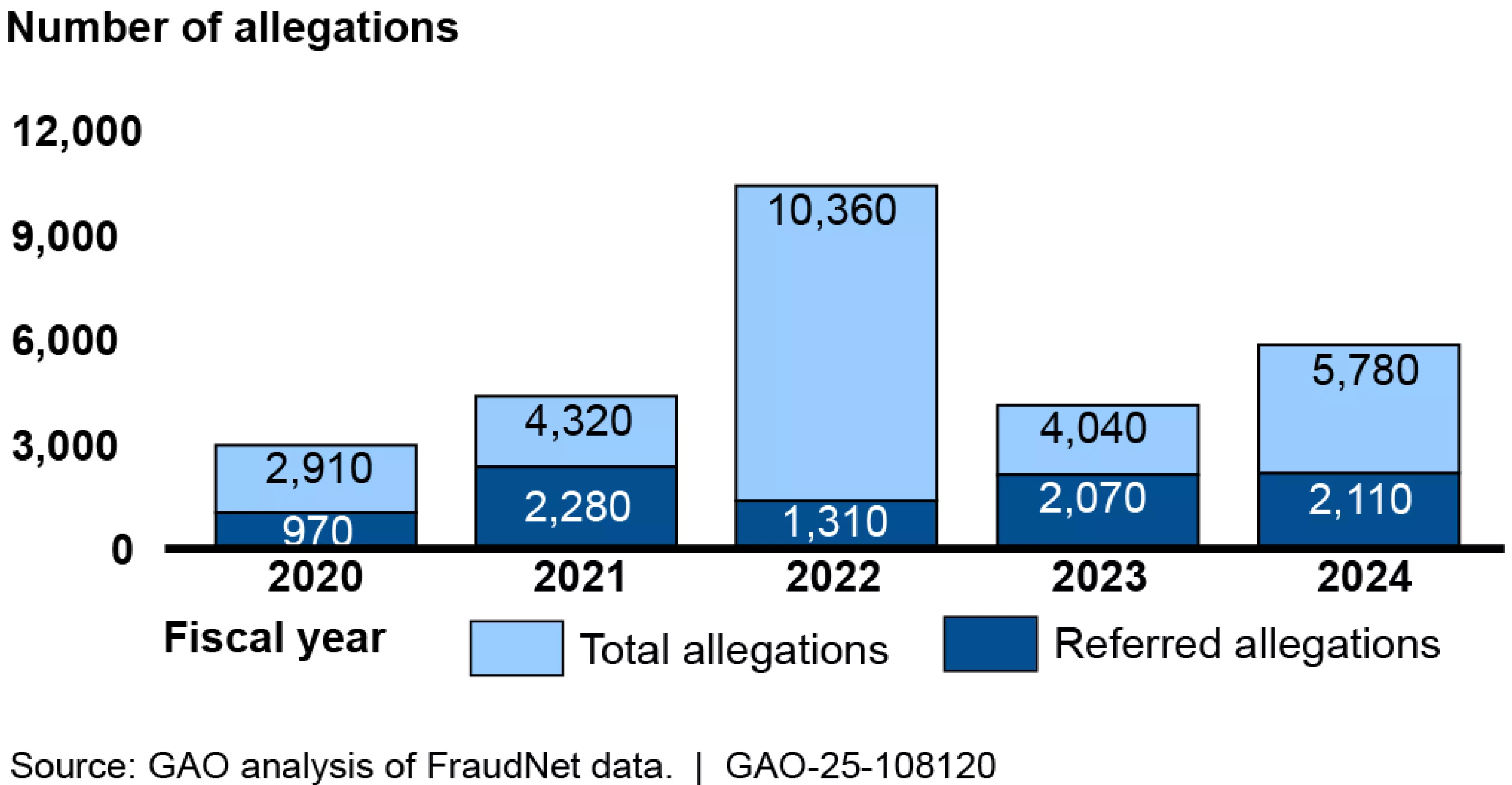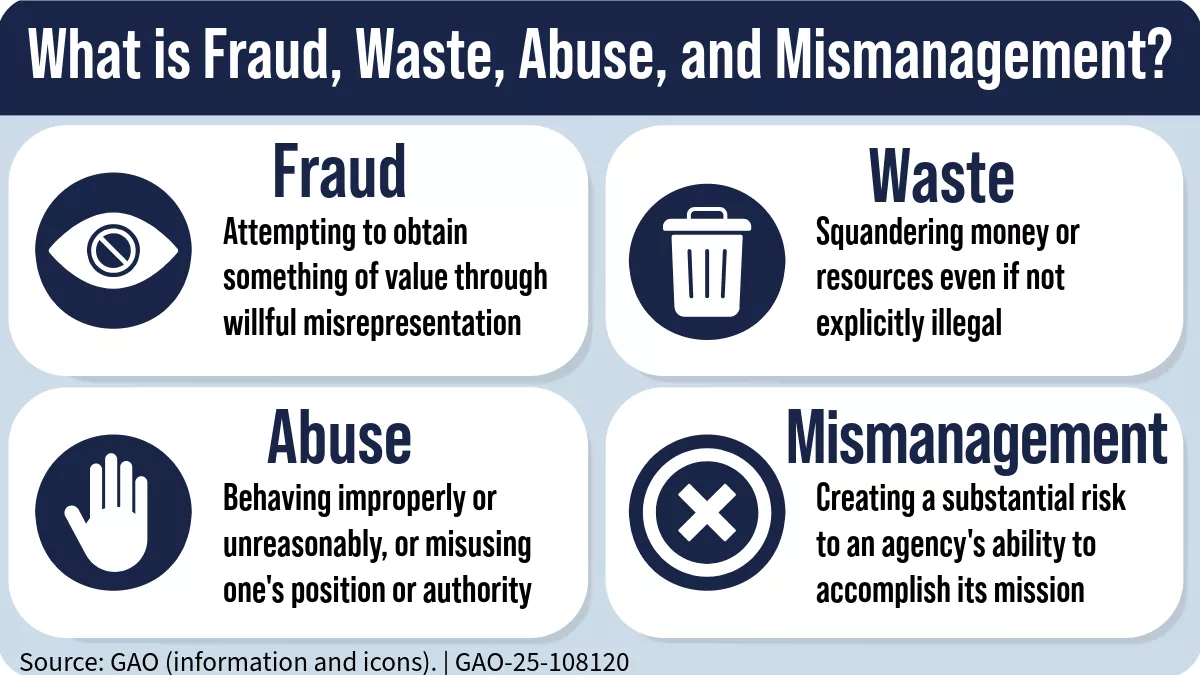How Many Allegations of Fraud were Reported in FY 2024? Here’s A Look at Our New FraudNet Activity Report
Fraud can cost the government millions of dollars each year. To help prevent fraud, GAO created FraudNet—a hotline and webpage that allows the public to confidentially report allegations of fraud, as well as waste, abuse, and mismanagement of federal funding and resources.
Each year, FraudNet staff process thousands of these claims. Today’s WatchBlog post takes a closer look at how FraudNet works and our latest activity report.
Image

What is FraudNet and how many allegations of fraud were reported last fiscal year?
FraudNet launched in 1979. Since then, it has been a resource for anyone—federal employees, contractors, or the public—to report their allegations confidentially. This past fiscal year alone, we received more than 5,780 allegations. About half were referred for further investigation by agencies like the Department of Justice and Offices of Inspector General at the Departments of Defense and the Treasury.
The number of allegations in FY 2024 were up compared to last year. And, in the last 5 years, this was the highest number of allegations received, outside of FY 2022. FY 2022 was an outlier because more than half the allegations received were associated with social media campaigns resulting in repeated form-letter complaints alleging the same fraud.
Image

How can you submit an allegation to FraudNet, and what happens next?
Anyone who suspects fraud, waste, abuse, or mismanagement of federal funds and resources/programs can confidentially submit an allegation through FraudNet. We offer an online complaint form or you can contact the FraudNet hotline at 1-800-424-5454.
If you are reporting an allegation involving classified information, please contact the hotline for additional guidance. We cannot accept classified information online.
Image

When submitting an allegation through the FraudNet website, you can help our analysts evaluate your report by selecting a category that best describes your allegation. In some cases, we may follow up for more information before moving forward.
Here are some best practices or "dos" to consider when filing an allegation:
- Provide the subject of your allegation including the name of the government agency, individual, or business and any other identifying information, such as addresses, phone numbers, email addresses.
- Provide contact information for yourself so the FraudNet team can reach out for follow-up if needed. Your complaint will still remain anonymous.
- Provide a narrative description that explains the nature, scope, timeframe, and how you came to learn about the activity in your allegation.
- If you have it, provide the law, rule, or regulation you believe was violated.
- Provide other agencies to which you have reported the activity in your allegation.
Once an allegation is submitted, our team reviews and documents it before determining the best course of action. This includes referring allegations to federal Offices of the Inspector General and other government entities for investigation or other next steps.
For example, in 2008, FraudNet received an anonymous allegation that a transportation security manager at the Marine Corps Logistics Base in Albany, Georgia accepted gifts in exchange for awarding business contracts. Our team referred the case to the Defense Criminal Investigative Service and other law-enforcement entities. Their investigation uncovered a scheme in which multiple public officials received hundreds of thousands of dollars in gifts. In exchange, the officials helped a private company overcharge the U.S. government millions of dollars. Eventually, six defendants pled or were found guilty of bribery, conspiracy to defraud the U.S., theft of government property, wire fraud, and more.
To learn more about recent FraudNet activity, check out our full report. You can also visit our Report and Prevent Fraud webpage for more information on FraudNet and additional antifraud resources.
- GAO’s fact-based, nonpartisan information helps Congress and federal agencies improve government. The WatchBlog lets us contextualize GAO’s work a little more for the public. Check out more of our posts at GAO.gov/blog.
- Got a comment, question? Email us at blog@gao.gov.
GAO Contacts
Related Products

GAO's mission is to provide Congress with fact-based, nonpartisan information that can help improve federal government performance and ensure accountability for the benefit of the American people. GAO launched its WatchBlog in January, 2014, as part of its continuing effort to reach its audiences—Congress and the American people—where they are currently looking for information.
The blog format allows GAO to provide a little more context about its work than it can offer on its other social media platforms. Posts will tie GAO work to current events and the news; show how GAO’s work is affecting agencies or legislation; highlight reports, testimonies, and issue areas where GAO does work; and provide information about GAO itself, among other things.
Please send any feedback on GAO's WatchBlog to blog@gao.gov.




